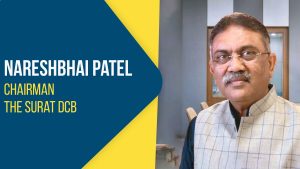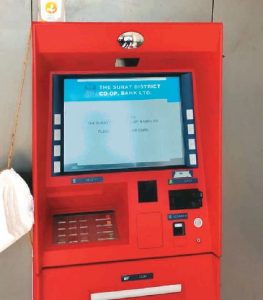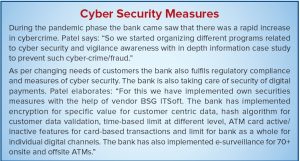Deployment of PoS has increased current account holders, and off-site ATM services have benefited dairy agents and sugar factories:

The Surat District Co-Operative Bank has been mainly working in rural areas of Tapi and Surat districts since 1909. At present Surat DCCB has 113 branches, of which 60 are in urban areas, and 51 in rural areas, with a head office and a regional office. Nareshbhai Patel, Chairman, updates: “We have expanded our footprint with 113 ATMs, out of which 19 are offsite and 94 on-site. Many of our on-site as well as off-site ATMs are located near to sugar factories, PACS, and cooperative societies. At present total 322 PACS are connected to the bank. Our bank has gained an image of a ‘Next Generation Agri Bank’.”
Merchant CA Up by PoS
Since 2009, Surat DCCB has gradually adopted technology based digital services. The bank has successfully started PoS/mPoS services from 8th April, 2015 for the benefits of merchants connected to it, without charging any installation fee or rent. The point of sale (PoS) is the time and place where a retail transaction is completed. Patel adds: “This has increased our current account holders’ ratio. We have distributed more than 458 POS/mPOS machines to different PACS and merchants.”
Surat DCCB started this service with Oxigen PoS machines. Patel adds: “Now we have shifted to Paytm PoS machines as they are more convenient for retail customers to use.”
CDM, mPoS At Dairies
The main customer base of Surat DCCB is in rural areas, where societies/PACS/milk federations are benefited by PoS/mPoS/micro-ATM services. Patel claims: “We are the first bank to start off-site ATM services at a DCCB level for Sumul dairy and sugar factories. The bank has installed cash deposit machines (CDMs) for its Sumul dairy agents so that they can deposit cash anytime.”
Mobile Banking Picking Up
The bank started mobile banking service in 2016. It has started many digital payment services such as RTGS/NEFT, CTS, ATM, E-commerce, PoS, mobile banking, IMPS, internet banking and many more. Step by step it has added more facility like prepaid recharge, utility bill payment, QR Code, e-statements, transaction On/Off and cheque status to its customers. Patel informs: “Post pandemic, seeing the urge of customers, we have increased transaction limit and count. This has led to almost Rs10 million transactions.”
Toll Free Service
The bank provides account balance, mini statements, card hot list, cheque book request and bill payment for BSNL, DGVCL, Torrent & Gujarat Gas in toll free banking service. This service is widely used in post pandemic situations as it has reduced the flow of public to the offices of these utility providers.”
E-mail Statement
Surat DCCB has started e-mail statement service. Patel elaborates: “In this service, registered customer can receive statement on their registered email ID on daily, weekly, monthly or quarterly basis. Day by day, the banking sector is becoming more and more crucial as it is directly/indirectly connecting to the wide range of customers. And to fulfil the requirements, our bank always plan well and get ready to implement at the earliest.”
Data Centre, IT Team
Surat DCCB is always ready to serve to its customers in best possible way through latest technologies. Patel points out: “Currently, bank has its own data centre including Near DR (disaster recovery) and Far DR sites. We have a 25-member dedicated IT team including ATM department. Our data centre is running 24x7x365, so our IT team is working in shifts, including on bank holidays. Each and every site (Prod, Near DR, Far DR), ATM and branch IT peripherals are managed by data centre IT team.
During the pandemic, even though banks have been available for specific time, most of customers find it difficult to use their own money. Surat DCCB’s customers have been habituated with traditional banking and there was small customer base using digital payment. Patel explains: “Our business got affected, so we started UPI service for our customers, as it is the channel which is used everywhere from small to large business areas. As a result of this, our large customer base started becoming part of digitization and our daily UPI volume increased in millions. Our bank started Rupay Debit cum ATM cards, Rupay KCC cards, CTS-NACH, ATM card hot-listing, cheque-book request, UPI (Issuer), ATM missed call security service, BHIM UPI missed call service (deactivating UPI service), social security schemes of government of India, CKYC-R, PFMS, CPPS and many more.”
Tech Vendors
In 2010 the Surat DCCB was one of the first DCCBs to go live on CBS platform. Surat DCCB is able to achieve this benchmark in co-operative banking sectors with the help of fintech collaboration. Vendors have been providing online and telephonic support to the Surat DCCB for CBS selection, implementation and testing. Prior to introduction of CBS, the bank was using Autosoft TBA system since 2006. For CBS, the bank chose Infrasoft Tech.
Patel informs: “BSG ITSoft is now our CBS vendor as well as switch vendor for IMPS & UPI service. BSG ITSoft provides CBS solution, payment switch and digital payment solution, with around different 70 products both on premise and ASP model. The IT company provides not only latest technology-based solutions but also offers unique solutions to secure digital transactions (e.g time-based transaction limit at different level) and many more.”
The bank has security measures implemented not only in firewall but also in UTM devices to manage and control network traffic and authentication. As per industry standard, it has implemented different types of backups to sustain in case of outage. Patel adds: “Our Near DR site is replica of production site and it is replicated using VMWare VSR technology, which replicates block base. We have different type of database (logical, physical) backups, application servers backups, network router backups and also device backup, which are managed by the VIM solution which take each backup in encrypted mode.”
Virtual Machines
The bank has been using multiple brands which are based on current latest technology for servers and used single brand for desktop to manage resources availability and manageability. Patel says: “Dell and IBM servers and HP desktops have been used by the bank. We have implemented virtual machine concept to host different modules separately, which enhance overall up time for all the applications.”
The bank has maintained redundancy at each hardware, software and network level. Router, switches, LAN cables and firewall, setup to secure inward as well as outward traffic, are the networking hardware. Antivirus setup and internet/network access privileges through monitoring software are being used in the bank. Patel adds: “Sanghvi Infotech is the service provider for networking, and for customization.”
Virtual IT Training, Updation
The government norms due to pandemic have restricted multiple training programs, organized by the bank for staff employees. Patel informs: “Our bank started conducting such necessary training programs online for employees by following covid-19 guidelines. Also, our bank has adopted digital methods such as video conference, virtual training programs and virtual events to prevent public gatherings.”
Surat DCCB’s management encourages its staff members to attend training programs conducted by National Institute of Co-operative Management (NICM), Ahmedabad; Vaikunth Mehta Institute of Co-operative Management, Pune and BIRD-Nabard at Lucknow. Patel adds: “Our bank enrols employees in specific training program based on their domain expertise and work profile. Banking skill and computer literacy amongst the staff members need an improvement. Thus, we have specially created in-house staff training centre and appointed an ex-banker from nationalised bank. IT training is conducted in exclusive state of the art training hall, having capacity of more than 140 people, to guide staff regarding customer awareness, especially in IT services. We have been educating staff about CBS, loan appraisals, audit of cooperative societies, GST, TDS, KYC & general banking. Vendors of software companies are also involved in such programs.”
Patel elaborates: “Our bank has so far provided in-house training to 350 staff members in 15 training sessions on various subjects round the year. So far, we have sent 51 employees in 22 programs to various institutes. We intend to conduct 2-3 training programs on monthly basis.”
Tracking Records, Expertise
Surat DCCB maintains computerised qualification records of employees and year of working experience in bank. Also, the bank publishes its own in-house magazine, in which each employee can participate in different blog sections. The bank also publishes recent achievements of employee with details. Patel says: “We also track domain expertise of employees and based on this as well as on latest market trend, each training program is conducted for specific employees periodically.”
Online Mktg, Social Media
This bank publishes marketing advertisement, FD and loan rate, current services and ATM locations on bank’s website as well as yearly calendars & dairies and at the branch notice board. Patel updates: “Our bank has social media account, where we promote many advertisements of the bank’s current programs. Also, this will help us to connect to new customer base as well as maintain long-lasting relationship with existing customers.”
Mobile Vans For 658 Villages
 Bank started mobile ATM vans, sponsored by NABARD, for customers in rural areas, where banking infrastructure development was not possible. Patel adds: “Through mobile vans, we provide doorstep banking service to customers in the interior parts of Surat and Tapi districts. We have 4 mobile vans covering our districts rural areas such as Mandvi, Mangrol, Vyara, Songadh. These mobile vans cover approximately 658 villages in the rural areas with around 29,000 customers as on today. By using mobile van, we have been able to increase our CASA deposit by 19.7% y/y.”
Bank started mobile ATM vans, sponsored by NABARD, for customers in rural areas, where banking infrastructure development was not possible. Patel adds: “Through mobile vans, we provide doorstep banking service to customers in the interior parts of Surat and Tapi districts. We have 4 mobile vans covering our districts rural areas such as Mandvi, Mangrol, Vyara, Songadh. These mobile vans cover approximately 658 villages in the rural areas with around 29,000 customers as on today. By using mobile van, we have been able to increase our CASA deposit by 19.7% y/y.”
The DCCB has started ATM mobile vans covering remote rural belts in the unbanked areas. Patel indicates: “Retail consumer banking has changed radically in the last few years and now one can expect to see a focus on the specific needs of corporate and business customers.”

Digital Means Profit
Patel concludes with analysis: “We consider all these IT-digital initiatives as part of business growth. In the pandemic situation, this is reflected not only in terms of money profit but also to help sustain at existing benchmark and earn customer trust by giving secure surrounding to them to perform digital transactions. This has helped to maintain customer stickiness and strong relationship with customers, which is definitely growing bank’s business. Today we can proudly say that our bank is one of the most tech-savvy DCC banks in Gujarat and perhaps in the country.”







